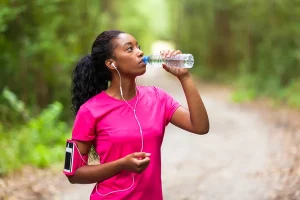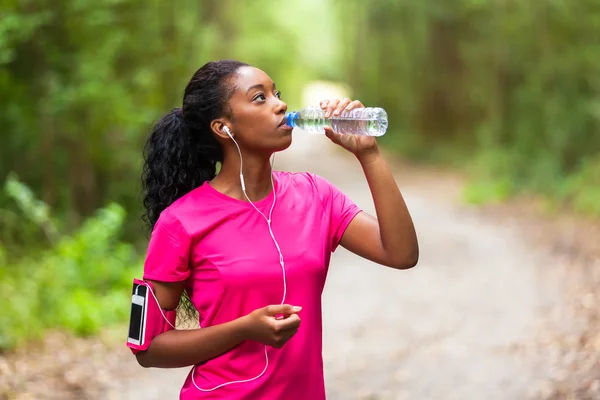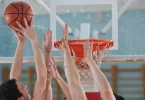The best way to enhance your body transformation is to follow the CICO (calories in, calories out) principle. In order to make this work, you would have to consume a set number of calories each day and constantly stay below/over a certain threshold (depending on whether you want to gain or lose weight).
Counting calories via meals is relatively easy. The calories you drink, on the other way, are much harder to keep track of. Soft drinks, shakes, and alcoholic beverages can seriously offset your CICO calculation. Not only that, but they can also significantly alter your daily macro-and micronutrient structure.
On the other hand, some beverages can enhance your workout potential, improve your recovery, and give you a significant energy boost. With all of this in mind, here’s what you should drink when you exercise.
Water Is Always the Best Choice
First thing first, if you want to stay hydrated, water should always be your drink of choice. Sipping throughout your training will keep you hydrated, seeing as how this is the period during which you’ll lose the most water. By staying hydrated, you’ll not allow this to affect your overall athletic performance. Still, you also want to keep sipping throughout the day.
With water, things are quite clear – you get refreshed and rehydrated without getting any calories.
For those who want more flavor, you can always add a slice of orange, lemon, or lime. A few mint leaves will also do the trick without setting you back in any way. There are many other healthy things you can add to water.
While there are some guides suggesting that you should drink 8 or 9 cups of water every day (at the minimum), this is just a crude estimate. The amount of water you need to stay hydrated depends on the temperature, your own perspiration (due to intensive training), and numerous other factors.
In a way, the quantity of water that you should consume may also be dictated by the supplementation that you’re using. For instance, when using creatine, it’s advised that you drink more water in order to prevent cramps.
Make Smoothies
While water and tea sound great and may even be a viable hydration plan on a regular basis, what about social occasions? Drinking water all night doesn’t look great, while tea may not even be an option. Fortunately, natural juices and smoothies are there to get you out of this rough spot.
This is especially great and viable if you’re looking for ideas for a brunch party that you, yourself are throwing. No, you don’t have to drink alcohol, and having a refreshing drink in your cup will give you all you need at once.
Now, a smoothie is an umbrella term and may mean a number of things. Some of them even contain more sugar than you would find, even in some of the worst sodas. Therefore, you need to find the right recipe.
For instance, weight-loss smoothies should contain protein powder, healthy fats, fibers, and be low on sugar. Raspberries, kale, pumpkin, and even a bit of banana are great bases for a tasty, nutritious liquid breakfast. Just remember that while a lot of nutrients can be acquired through supplementation, it might be a good idea to get the bulk of it through your meals/drinks.
Drink Tea
Tea is also a great calorie-free (every cup has somewhere about 2 calories) drink that you can turn to during exercise. However, seeing as how each of them comes from a different herb, fruit, or mix, every single one of them has something else to contribute.
For instance, green and black tea is a healthier substitute for coffee. They add caffeine to the mix without any of the negative aspects. Seeing as how caffeine is one of the key micronutrients for staying energized and unleashing your maximum potential during the training, it’s always a good idea to take these teas before the training.
Then, there are some teas that are amazing for cooling down after a workout. Iced teas, for instance, can be an amazing way for you to replenish the lost fluids and electrolytes. This is especially great in the summer, and some people prefer to bring their tea of choice in a thermos.
English Breakfast Tea is a surprising source of phosphorus and magnesium, both of which are vital (often underestimated) micronutrients. Instead of making a habit of trying to remember to take these supplements in the form of a pill, why not simply introduce post-training tea time into your regular routine.

Avoid Energy Drinks
While everyone knows that, during the weight-cutting stage, they’re to avoid soft drinks and alcohol, the same cannot be said about energy drinks. After all, this is something that boosts your energy levels, so isn’t it intuitive that consuming them will increase your athletic performance? While there is some crude logic to this, you might want to assume a different approach.
Large amounts of caffeine are never good for developing kids and young adults. However, if it’s the caffeine you crave, it’s always better to just go straight for a caffeine supplement. This way, you get it without added sugars, which is a massive improvement.
Also, while caffeine is not necessarily the safest of substances, it’s not the only thing there is in coffee and energy drinks. With caffeine supplements, you at least get some of them out of the way.
Check the Label
Before you drink something that you’ve bought, make sure to check the label. Check the calories, the sugar, and all the components before you drink. You see, it’s not that those soft drinks, bottled drinks, or sodas are inherently bad. It’s just that they have components that you either have to minimize or eject completely from your eating/drinking regimen.
It’s ok to introduce a cheat drink every once in a while, but it’s even better to just change your routine. As we’ve discussed so far with tea and smoothies (even with a caffeine supplement as a substitute), every single one of these undesirable drinks has a healthy (and tasty) alternative.
The key thing is that you develop a habit of thinking about your drinks instead of just chugging them. Think about the contents, count them, and, overall, strategize when planning what to drink. This alone will make a world of difference.
Conclusion
It’s important that you listen to your body, seeing as how thirst is a natural, organic process. As you lose more water, your cravings for rehydration will increase. Also, while some guides suggest that you should drink X amount of water every day, this is dependent on so many different factors. Everyone’s needs are different, and so is every situation. So, make your own plan or, better yet, contact a professional nutritionist or caterer to help you out. Either way, this is a great long-term solution that’s definitely worth investing in.








